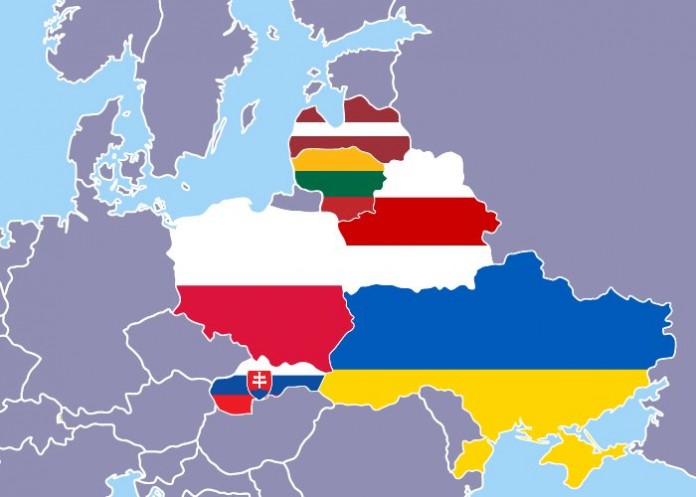Litwin
Platinum Member
do you agree with Mackinder that Eastern Europe is the most important (geostrategically) part of the world?
.....
The Geographical Pivot of History, sometimes simply as The Pivot of History is a geostrategic theory, also known as Heartland Theory.[1] "The Geographical Pivot of History" was an article submitted by Halford John Mackinder in 1904 to the Royal Geographical Society that advanced his Heartland Theory.[2][3] In this article, Mackinder extended the scope of geopolitical analysis to encompass the entire globe.
"Who rules East Europe commands the Heartland;
who rules the Heartland commands the World-Island;
who rules the World-Island commands the world."
...
Strategic importance of Eastern Europe
Later, in 1919, Mackinder summarised his theory as:
"Who rules East Europe commands the Heartland;
who rules the Heartland commands the World-Island;
who rules the World-Island commands the world."
(Mackinder, Democratic Ideals and Reality, p. 150)
Any power which controlled the World-Island would control well over 50% of the world's resources. The Heartland's size and central position made it the key to controlling the World-Island.
The vital question was how to secure control for the Heartland. This question may seem pointless, since in 1904 the Russian Empire had ruled most of the area from the Volga to Eastern Siberia for centuries. But throughout the nineteenth century:
One of Mackinder's personal objectives was to warn Britain that its traditional reliance on sea power would become a weakness as improved land transport opened up the Heartland for invasion and / or industrialisation (Sempa, 2000).
The Geographical Pivot of History - Wikipedia
.....
The Geographical Pivot of History, sometimes simply as The Pivot of History is a geostrategic theory, also known as Heartland Theory.[1] "The Geographical Pivot of History" was an article submitted by Halford John Mackinder in 1904 to the Royal Geographical Society that advanced his Heartland Theory.[2][3] In this article, Mackinder extended the scope of geopolitical analysis to encompass the entire globe.
"Who rules East Europe commands the Heartland;
who rules the Heartland commands the World-Island;
who rules the World-Island commands the world."
...
Strategic importance of Eastern Europe
Later, in 1919, Mackinder summarised his theory as:
"Who rules East Europe commands the Heartland;
who rules the Heartland commands the World-Island;
who rules the World-Island commands the world."
(Mackinder, Democratic Ideals and Reality, p. 150)
Any power which controlled the World-Island would control well over 50% of the world's resources. The Heartland's size and central position made it the key to controlling the World-Island.
The vital question was how to secure control for the Heartland. This question may seem pointless, since in 1904 the Russian Empire had ruled most of the area from the Volga to Eastern Siberia for centuries. But throughout the nineteenth century:
- The West European powers had combined, usually successfully, in the Great Game to prevent Russian expansion.
- The Russian Empire was huge but socially, politically and technologically backward—i.e., inferior in "virility, equipment and organization".
- The Heartland was protected from sea power by ice to the north and mountains and deserts to the south.
- Previous land invasions from east to west and vice versa were unsuccessful because lack of efficient transportation made it impossible to assure a continual stream of men and supplies.
- Successful invasion of Russia by a West European nation (most probably Germany). Mackinder believed that the introduction of the railroad had removed the Heartland's invulnerability to land invasion. As Eurasia began to be covered by an extensive network of railroads, there was an excellent chance that a powerful continental nation could extend its political control over the Eastern European gateway to the Eurasian landmass. In Mackinder's words, "Who rules East Europe commands the Heartland."
- A Russo-German alliance. Before 1917 both countries were ruled by autocrats (the Tsar and the Kaiser), and both could have been attracted to an alliance against the democratic powers of Western Europe (the US was isolationist regarding European affairs, until it became a participant of World War I in 1917). Germany would have contributed to such an alliance its formidable army and its large and growing sea power.
- Conquest of Russia by a Sino-Japanese empire (see below).
One of Mackinder's personal objectives was to warn Britain that its traditional reliance on sea power would become a weakness as improved land transport opened up the Heartland for invasion and / or industrialisation (Sempa, 2000).
The Geographical Pivot of History - Wikipedia

